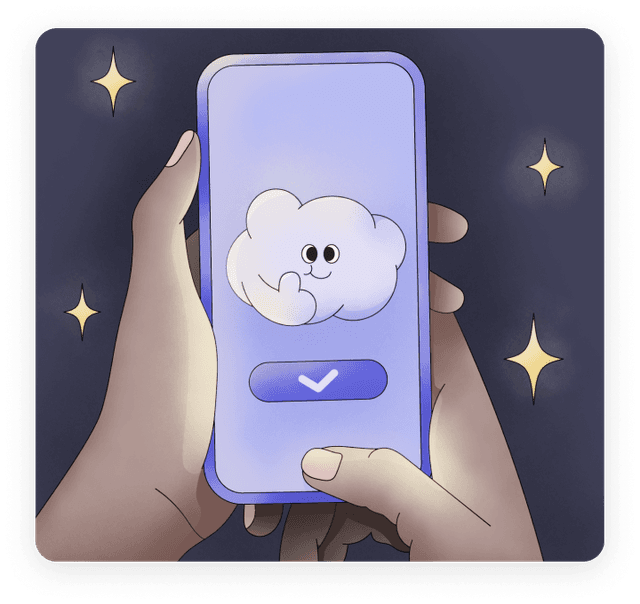
Denys Chumak
06 Jan 2024
Is Lucid Dreaming Scary? A Look at Lucid Nightmares
For a long time, people have been interested in lucid dreaming, which means being aware of and in charge of your dreams. Thinking about exploring uncharted territory in your dreams is exciting. But as with any new area, there can be surprises and risks.
One risk of lucid dreaming is having nightmares or becoming paralyzed during sleep. There are two things we'll look at here as part of our exploration: Is lucid dreaming scary?
How to Understand Lucid Dreaming: A Brief Outline
Before looking into whether lucid dreams can be scary, it's essential to understand what they are and how they work. When someone is dreaming and is aware that they are dreaming, this is called lucid dreaming. This gives the dreamer the power to control, change, and shape the dream's content.
Many try lucid dreams to explore their minds. Moreover, they face fears or have strange and memorable experiences. Dreamscapes may not always lead to pleasant dreams, though. For some people, their vivid dream experience could become scary.
There are things called "lucid nightmares" that may not make sense at first. Since lucid dreaming is generally linked with being more aware of and in charge of your dreaming, sometimes, people still can't control the scary parts of their dreams, even when they are aware of them.
Lucid dreams can be terrifying and solid experiences for dreamers. Even though they are aware they are dreaming, their fear and anxiety grow because they can't stop what's happening in the dream. This makes the meeting even more upsetting.
There are several reasons why people may have scary lucid dreams. Some causes could be lingering fears, anxiety, or trauma that show up in dreams. Other times, trying to control a dream can lead to scary and unexpected events because the inner mind doesn't want to be controlled.
Also read: What is Lucid Dreaming?
Sleep Paralysis: A Scary Link Between Your Dreams And Real Life
One of the lucid dream scary things that can happen when you lucid dream is sleep paralysis, which mixes reality with your thoughts. Sleep paralysis is when someone briefly loses the ability to move or speak while sleeping or waking up. They may also have detailed dreams and a strong sense that bad things are about to happen.
People with sleep paralysis fall into partial awareness, knowing their surroundings but can't move or speak. When this state is mixed with images of scary shadows and evil figures hanging over you, it can be terrifying.
There is a direct link between sleep paralysis and lucid dreams. A lot of people use sleep paralysis as a state in between waking up and dreaming. Lucid dreaming adds an extra level of awareness to this state. People may feel like they can't move, have dreams, and be very aware simultaneously, which can be scary and leave them gasping for air.
The Science Behind Lucid Dreaming
Researchers and experts are interested in lucid dreaming, which is when a person is aware and awake in their dreams. This is because it could help them understand how the mind works. Scientists studying lucid dreaming also look into the physiology, psychology, and brain processes involved. This gives us more information about this exciting experience.
Thoughts and REM Sleep:
Rapid Eye Movement (REM) sleep, the part of the sleep cycle linked to vivid dreams, has been linked to lucid dreaming for a long time. According to research, during this stage, brain activity is similar to when a person is awake, with more activity in areas responsible for self-awareness and decision-making. During REM sleep, certain brain areas connected to self-reflection and awareness become active during the dream state. This makes Lucid Dreaming possible when these areas of awareness become active during the dream state.
Involvement of the Prefrontal Cortex:
The prefrontal cortex is essential to lucid dreaming. It is in the front of the brain and is in charge of higher cognitive processes. Neuroimaging techniques, such as functional magnetic resonance imaging (fMRI), have shown that this brain area is more active during lucid dreaming. This area connects self-awareness, working memory, and metacognition functions, which help people recognize and control their dreams.
Brain Chemicals and Lucidity:
The right mix of brain chemicals like acetylcholine and serotonin is essential for having detailed dreams, especially during REM sleep. Acetylcholine may make the brain work faster while you dream, while serotonin levels drop. This creates the perfect conditions for blocking out outside influences and having detailed dreams.
Brain Waves:
When someone is lucid dreaming, their brainwave patterns change. More theta waves are usually linked to deep relaxation and the early stages of sleep. These waves become stronger during lucid dreaming and help people stay aware while in their dream world.
Training and Cognitive Techniques:
Many scientific studies have examined how well cognitive techniques can help people have transparent dreams. Reality checking, an activity in which a person constantly questions their reality throughout the day, has greatly enhanced the number of vivid dreams a person has. These methods might change the brain's ability to tell the difference between dream and waking states, which would make the mental parts of lucid dreaming stronger.
Possible Therapeutic Uses:
Researchers are looking into how lucid dreaming could be used in therapy in addition to its scientific study. Lucid dreaming may help people with nightmares, post-traumatic stress disorder (PTSD), and other mental health problems because it gives them control over their dreams, where they can deal with upsetting events and rethink them more healthily.
Research into lucid dreaming helps us understand how the brain works while we sleep. It gives us a detailed look at the neural processes that allow people to become aware while they dream. Suppose this type of dreaming is studied more. It might reveal more questions about consciousness in dreams. And lead to new ways to help people learn more about consciousness while sleeping.
Different Ways Lucid Dreams Cause Scariness
People often praise lucid dreaming, in which they know they are dreaming and have some control over their dream world, for its ability to bring about excellent and exciting experiences. But this kind of thinking has a wrong side as well. These dreams can be scary and make you feel scared in several ways, which we'll discuss here. Strange and unsettling things can happen in lucid dreams, making people feel nervous or uncomfortable in their dream world.
One of the difficulties of lucid dreaming is that it can be paradoxical. People may become aware of their dreams but may not always feel fully in control. As events progress, they may sometimes feel like they can't change or control what's happening and feel useless as things happen. This can cause worry and fear as the dreamer idly watches events happen.
Uncanny Realism:
People with lucid dreams often feel like they are in a world. That is more real than the one they are dreaming about. When this realism goes dark, dreamers may see scary images. That comes to life in stunningly natural horror scenes that can be scary. The fact that our minds can create such realistic scenes. It adds another layer of fear to this already scary experience.
Unexpected Changes:
Lucid dreamers often enjoy being able to shape-shift. Or change the environment of their dreams. However, when these changes go in a scary direction, the dreamer may find themselves facing scary entities or strange landscapes, making them scared as their reality keeps changing into something even scarier and darker.
Nightmares Can Happen During Lucid Dreaming:
Nightmares can happen during lucid dreaming, too. People may have scary things happen to them in lucid dreams, just like in regular nightmares, but they are aware that their nightmare was made up in their minds. This fact alone may make you feel more scared in your dreams, which makes clarity an essential tool for dealing with nightmares.
Sleep Paralysis and Lucid Dreaming:
You can't separate lucid dreaming from sleep paralysis. People experience sleep paralysis when awake, but their bodies are briefly frozen, making it impossible to act out their thoughts. This phenomenon might put dreamers in a lousy mood by trapping them between awake and dreaming. They may have dreams or feel the world's end is coming soon.
Unresolved Emotional Issues:
Lucid dreams give the subconscious mind a way to explore unresolved emotional issues in a vivid, nightmare-like way in the dream world, forcing people to face their inner fears and worries that have been dormant inside them. These events can leave a lasting mark, making lucid dreams even scarier.
There is much room for exploration and imagination in lucid dreaming, but knowing that it can lead to mentally tricky situations is also essential. As we've already discussed, the thin line between order and chaos can lead to scary dreams that make people face the darker parts of their minds.
Advice on Having a Pleasant Lucid Dream
The charm of lucid dreaming may be diminished by sleep paralysis and nightmares. However, there are methods to cultivate dream experiences that are more pleasurable. If you want to improve the quality of your dreams, try sticking to a regular sleep pattern, checking your reality checks throughout the day, and maintaining a dream diary. These practices will help you become more self-aware and learn to identify when you're dreaming.
One way to improve the quality of one's dreams is to do visualization exercises that encourage happy situations to be imagined before sleep. In addition, lucid dreaming can be a positive experience if approached with curiosity and acceptance instead of fear.
By recognizing the dream's potential for personal growth and exploration, people can turn what could be a terrifying nightmare into a chance for empowerment and development.
Also read: Dream Analysis: The Secret Truths Your Dreams Reveal
Getting Rid of Fear While Lucidity Dreaming
People who believe in lucid dreams say that scary events like dreams and sleep paralysis can help you grow and learn about yourself. Facing your fears in your dreams can make you stronger and help you learn more about yourself and how you work.
Many different methods are suggested for turning scary situations into good ones. One way to deal with transparent dreams is to be friendly, relaxed, and logical during them while actively working to change the story and face any fears head-on. Mindfulness and visualization exercises may also help you feel you have control over your dreams.
Sleep paralysis can be scary for the person who has it, but knowing how it works can help them feel better. Knowing that it's just a regular part of their sleep routine and that it will pass can help them feel less anxious about it.
Also read: A Beginner's Guide To Dream Interpretation & 8 Common Dreams
Summary on Can Lucid Dreams Be Scary
Lucid dreams can be exciting and scary, based on the person and what they've been through. Even though experiencing an endless dream world is interesting, the fact that it could lead to nightmares or sleep paralysis makes it scary. However, people who believe in lucid dreaming say that facing fears in dreams may help some people grow as people and gain power.
Are lucid dreams scary? No matter how you feel about lucid dreaming—whether exciting or scary—one thing is sure: exploring it is very subjective and personal. As scientists continue to study awareness and dreams, how they interact with each other is still an exciting area of personal and scientific inquiry. Consider DreamApp, an online dream dictionary, to figure out the mystery behind your dreams.
FAQs
1. Can everyone learn lucid dreaming, or is this exclusively reserved for some individuals?
Lucid dreaming is an acquired skill with practice. Reality checks and mindfulness make the practice accessible to more people.
2. Are lucid nightmares more prevalent among those actively inducing lucid dreams?
Lucid nightmares aren't exclusive to practitioners; they may stem from fears and anxieties, presenting opportunities for personal development within the dream state.
3. How can one distinguish a lucid nightmare from an ordinary nightmare?
Lucid nightmares arise when a dreamer is aware of but unable to control its disturbing elements.
4. Are sleep paralysis and lucid dreaming inextricably linked?
Sleep paralysis can arise both independently and when trying to access lucid dreams. Becoming acquainted with its natural occurrence in the sleeping cycle. This helps navigate and cope with this potentially unpleasant experience.
Did you have an unusual dream with this symbol?
Let's analyze this dream with our expert!
At least five words, please.

Your dreams are completely private
Take control of your dream emotions in the free mobile app



The most recent users' dreams
Go to the user dreams page
Dream App
Free dream interpretations

(1,213)











